
The European Environment Agency (EEA) is the agency of the European Union (EU) which provides independent information on the environment.
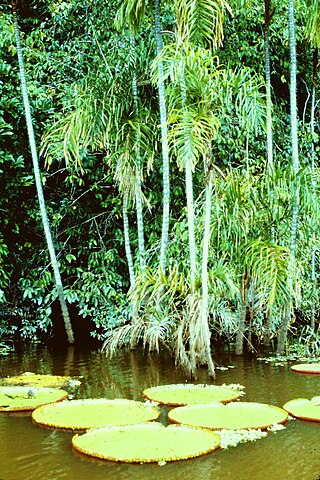
A biotope is an area of uniform environmental conditions providing a living place for a specific assemblage of plants and animals. Biotope is almost synonymous with the term "habitat", which is more commonly used in English-speaking countries. However, in some countries these two terms are distinguished: the subject of a habitat is a population, the subject of a biotope is a biocoenosis or "biological community".
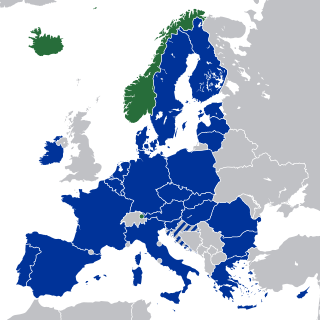
The European Economic Area (EEA) was established via the Agreement on the European Economic Area, an international agreement which enables the extension of the European Union's single market to member states of the European Free Trade Association. The EEA links the EU member states and three EFTA states into an internal market governed by the same basic rules. These rules aim to enable free movement of persons, goods, services, and capital within the European single market, including the freedom to choose residence in any country within this area. The EEA was established on 1 January 1994 upon entry into force of the EEA Agreement. The contracting parties are the EU, its member states, and Iceland, Liechtenstein, and Norway. New members of EFTA would not automatically become party to the EEA Agreement, as each EFTA State decides on its own whether it applies to be party to the EEA Agreement or not. According to Article 128 of the EEA Agreement, “any European State becoming a member of the Community shall, and the Swiss Confederation or any European State becoming a member of EFTA may, apply to become a party to this Agreement. It shall address its application to the EEA Council.” EFTA does not envisage political integration. It does not issue legislation, nor does it establish a customs union. Schengen is not a part of the EEA Agreement. However, all of the four EFTA States participate in Schengen and Dublin through bilateral agreements. They all apply the provisions of the relevant Acquis.

Eurostat is a Directorate-General of the European Commission located in the Kirchberg quarter of Luxembourg City, Luxembourg. Eurostat's main responsibilities are to provide statistical information to the institutions of the European Union (EU) and to promote the harmonisation of statistical methods across its member states and candidates for accession as well as EFTA countries. The organisations in the different countries that cooperate with Eurostat are summarised under the concept of the European Statistical System.

The European Union Institute for Security Studies (EUISS) is a Paris-based agency of the European Union (EU) within the realm of Common Foreign and Security Policy (CFSP). The EUISS is an autonomous agency with full intellectual freedom and researches security issues of relevance for the EU and provides a forum for debate. In its capacity as an EU agency, it also offers analyses and forecasting to the High Representative for Foreign Affairs and Security Policy, Josep Borrell.

Although there has been a large degree of integration between European Union member states, foreign relations is still a largely intergovernmental matter, with the 27 states controlling their own relations to a large degree. However, with the Union holding more weight as a single entity, there are at times attempts to speak with one voice, notably on trade and energy matters. The High Representative of the Union for Foreign Affairs and Security Policy personifies this role.
The Framework Programmes for Research and Technological Development, also called Framework Programmes or abbreviated FP1 to FP9, are funding programmes created by the European Union/European Commission to support and foster research in the European Research Area (ERA). Starting in 2014, the funding programmes were named Horizon.
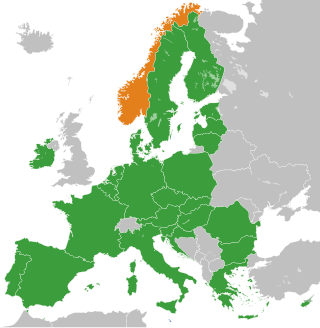
Norway is not a member state of the European Union (EU). However, it is associated with the Union through its membership of the European Economic Area (EEA), signed in 1992 and established in 1994. Norway was a founding member of the European Free Trade Association (EFTA) in 1960, which was originally set up as an alternative to the European Economic Community (EEC), the main predecessor of the EU. Norway had considered joining both the EEC and the European Union, but opted to decline following referendums in 1972 and 1994. According to the European Social Survey conducted in 2018, 73.6% of Norwegians would vote 'No' in a referendum to join the European Union. Norway has two land borders with EU member states: Finland and Sweden.

Turkey hosts more than three thousand endemic plant species, has high diversity of other taxa, and is almost entirely covered by three of the world's thirty-five biodiversity hotspots. Although some environmental pressures have been decoupled from economic growth the environment still faces many threats, such as coal and diesel fuel emitting greenhouse gases and deadly fine particulate air pollution. As of 2023 there is no fine particulate limit and coal in Turkey is subsidized. Some say the country is a pollution haven.

The Landfill Directive, more formally Council Directive 1999/31/EC of 26 April 1999, is a European Union directive which regulates waste management of landfills in the European Union. It was to be implemented by EU Member States by 16 July 2001. Directive (EU) 2018/850 amended the 1999 directive with effect from 5 July 2020.

Copernicus is the Earth observation component of the European Union Space Programme, managed by the European Commission and implemented in partnership with the EU Member States, the European Space Agency (ESA), the European Organisation for the Exploitation of Meteorological Satellites (EUMETSAT), the European Centre for Medium-Range Weather Forecasts (ECMWF), the Joint Research Centre (JRC), the European Environment Agency (EEA), the European Maritime Safety Agency (EMSA), Frontex, SatCen and Mercator Océan.

Lake Karla is a lake that sits at 60 to 80 m above sea level making it the only one in the plain of Thessaly. The lake is located at the northern end of the Magnesia regional unit in the Pineios basin, adjacent to Pelion and the Maurovouni mountains. On the eastern part of the lake the lies the town of Kanalia.

The Republic of Azerbaijan and the European Union (EU) have maintained a positive relationship through the years and have become more closely linked since 1991. Azerbaijan is currently part of the European Neighborhood Policy, the Eastern Partnership and the Council of Europe. The EU is the largest foreign grant donor to and investor in Azerbaijan, both in the government sector and civil society, making available over 600 million EURO of bilateral EU assistance since 1992.
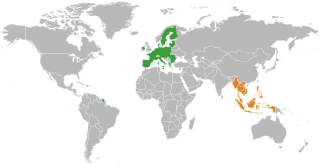
The ASEAN–European Union relations are the bilateral foreign relations between the two organisations; the European Union (EU), and the Association of South-East Asian Nations (ASEAN). EU and ASEAN have been interacting with each other on the economic, trade, and political levels for more than four decades. The partnership between the EU and ASEAN dates back to 1972, when the EU established ties with ASEAN. The EU became an ASEAN Dialogue Partner in 1977.
The EEA Grants and Norway Grants represent the contributions of Iceland, Liechtenstein and Norway to reducing social and economic disparities in the European Economic Area (EEA) and strengthening bilateral relations with 15 EU countries in Central and Southern Europe. Through the Grants, Iceland, Liechtenstein, and Norway are also contributing to strengthening fundamental European values such as democracy, tolerance and the rule of law.
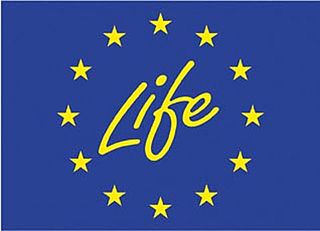
The LIFE programme is the European Union's funding instrument for the environment and climate action. The general objective of LIFE is to contribute to the implementation, updating and development of EU environmental and climate policy and legislation by co-financing projects with European added value. LIFE began in 1992 and to date there have been five phases of the programme. During this period, LIFE has co-financed some 4600 projects across the EU, with a total contribution of approximately 6.5 billion Euros to the protection of the environment and of climate. For the next phase of the programme (2021–2027) the European Commission proposed to raise the budget to 5.45 billion Euro.

European Union–Pakistan relations are the international relations between the common foreign policy and trade relations of the European Union and the Islamic Republic of Pakistan.
The Common Database on Designated Areas or CDDA is a data bank for officially designated protected areas such as nature reserves, protected landscapes, national parks etc. in Europe.
Since the late 1970s, the European Union's (EU) policy has been to develop and drive appropriate measures to improve air quality throughout the EU. The control of emissions from mobile sources, improving fuel quality and promoting and integrating environmental protection requirements into the transport and energy sector are part of these aims.
The European Union's scientific collaboration beyond the bloc describes the European Union's frameworks for bilateral cooperation and specific projects in science and technology with countries and regional blocs situated beyond the European Union.













